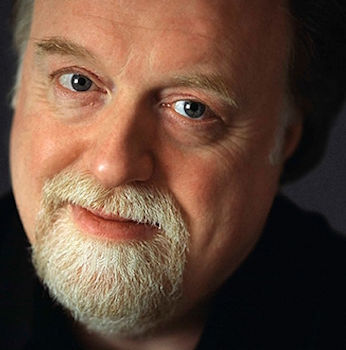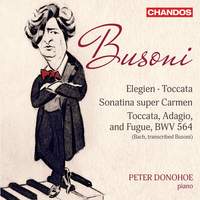Recording of the Week,
Peter Donohoe plays Busoni
It was in the late 1990s that I had my first encounter with the weird and wonderful world of Ferruccio Busoni, thanks to a rather esoteric pub quiz which included the question ‘Which composer’s piano concerto features a male-voice choir in the final movement?’. I can’t take credit for supplying the correct answer, but the team-mate who came up trumps insisted that we all repair to his flat to experience it in all its sprawling and unpredictable glory via a live recording from the Proms a decade earlier (now, alas, no longer available), with Peter Donohoe as soloist and Sir Mark Elder conducting the BBC Symphony Orchestra.
 I owe a double thank-you, then, to the intrepid British pianist - both for that impromptu late-night induction as an undergraduate and for today’s Recording of the Week, which introduced me to two equally startling solo piano works with an exuberance that will likely linger in my memory for another twenty years. From the opening bars of the Toccata from 1921 (new to me), which bursts into life like an exploding glitter-ball, Donohoe’s delight in this music is infectious – here and throughout the album, he strikes a captivating balancing-act which shines a spotlight on Busoni’s often outlandish technical demands whilst never leaving you in any doubt that he’s got them completely under control, so that by the end you’re left feeling as if you’ve just enjoyed an exhilarating high-speed ride with a driver who never leaves you in fear for your life or theirs.
I owe a double thank-you, then, to the intrepid British pianist - both for that impromptu late-night induction as an undergraduate and for today’s Recording of the Week, which introduced me to two equally startling solo piano works with an exuberance that will likely linger in my memory for another twenty years. From the opening bars of the Toccata from 1921 (new to me), which bursts into life like an exploding glitter-ball, Donohoe’s delight in this music is infectious – here and throughout the album, he strikes a captivating balancing-act which shines a spotlight on Busoni’s often outlandish technical demands whilst never leaving you in any doubt that he’s got them completely under control, so that by the end you’re left feeling as if you’ve just enjoyed an exhilarating high-speed ride with a driver who never leaves you in fear for your life or theirs.
But as the first couple of minutes of that ride amply demonstrate, there’s also some breathtaking scenery along the way: the second main musical idea of the Toccata has a hazy, almost Debussy-ish beauty which Donohoe captures to perfection, and indeed his mesmerising pianissimo playing is a recurring pleasure over the course of the next hour. It’s especially in evidence in the second work on the programme (another discovery for me), the 7 Elegien, the first six of which Busoni premiered in Berlin in 1909 and considered ‘a milestone in my development’ as he moved away from the late-Romantic idiom of his earlier works and became increasingly interested in pushing the boundaries of tonality. Critics on that occasion were rather less convinced, with one pronouncing the piece ‘a veritable source of dismay’ due to its strange shifting harmonic language, which Donohoe evidently understands inside-out and presents with clear-eyed logic as well as poetry.
 Whilst the music is still deliciously disconcerting in some respects, its innate beauty is hard to resist: the eerie, morbid allure of Erscheinung (recycled from Busoni’s 1906 opera Die Brautwahl) is a case in point, as is the puckishly virtuosic treatment of ‘Greensleeves’ in Turandots Frauengemach, which Busoni delivered in a fit of devilry in response to a request for a straightforward piano-reduction of his incidental music for use in rehearsals for a production of Gozzi’s Turandot. (Antony Beaumont’s excellent booklet-note, as illuminating as Donohoe’s musicianship, has chapter-and-verse on this). Donohoe also excels in the uncanny chiaroscuro world of All’italia, which reworks material from the Piano Concerto and shifts from a brooding, unsettled opening to a manic tarantella that will sit in your head rent-free for days.
Whilst the music is still deliciously disconcerting in some respects, its innate beauty is hard to resist: the eerie, morbid allure of Erscheinung (recycled from Busoni’s 1906 opera Die Brautwahl) is a case in point, as is the puckishly virtuosic treatment of ‘Greensleeves’ in Turandots Frauengemach, which Busoni delivered in a fit of devilry in response to a request for a straightforward piano-reduction of his incidental music for use in rehearsals for a production of Gozzi’s Turandot. (Antony Beaumont’s excellent booklet-note, as illuminating as Donohoe’s musicianship, has chapter-and-verse on this). Donohoe also excels in the uncanny chiaroscuro world of All’italia, which reworks material from the Piano Concerto and shifts from a brooding, unsettled opening to a manic tarantella that will sit in your head rent-free for days.
The Lisztian Sonatina super Carmen (1920) offers a similar blend of light and darkness, Donohoe revelling in the brash double-octaves and athletic leaps around the keyboard which conjure Bizet’s Act Four traders and hawkers into vivid life, as well as the filigree which gilds José’s Flower Song; perhaps not unexpectedly, it’s the slippery chromatic language of Carmen’s Habanera and the Fate motif which really grabs Busoni’s harmonic imagination, and the piece closes out in a mood of murky uncertainty rather than a blaze of glory.
That blaze follows hard upon, though, with a big-boned but beautifully balanced and delineated account of the transcription of JS Bach’s Toccata, Adagio and Fugue BWV 564; Donohoe describes it as ‘one of the most joyous pieces in the history of instrumental music’, and that joy certainly registers loud and clear in the ringing fortissimo chords which bring this vibrant recital to a resounding close.
Peter Donohoe (piano)
Available Formats: CD, MP3, FLAC, Hi-Res FLAC



